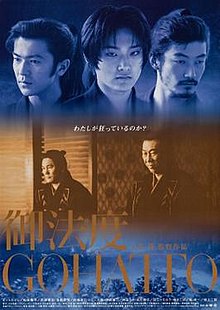Gohatto
| Gohatto | |
|---|---|
 | |
| Directed by | Nagisa Oshima |
| Written by | Nagisa Oshima |
| Produced by | Masayuki Motomochi |
| Starring | Ryuhei Matsuda Takeshi Kitano Tadanobu Asano |
| Cinematography | Toyomichi Kurita |
| Edited by | Tomoyo Oshima |
| Music by | Ryuichi Sakamoto |
| Distributed by | Shochiku New Yorker Films (USA) |
Release date |
|
Running time | 100 minutes |
| Country | Japan |
| Language | Japanese |
Gohatto (御法度) or Taboo is a 1999 Japanese film directed by Nagisa Oshima. It is about homosexuality in the Shinsengumi during the bakumatsu period, the end of the samurai era in the mid-19th century.
Plot
At the start of the movie, the young and handsome Kanō Sōzaburō (Ryuhei Matsuda) is admitted to the Shinsengumi, an elite samurai group led by Kondō Isami (Yoichi Sai) that seeks to defend the Tokugawa shogunate against reformist forces. He is a very skilled swordsman, but it is his appearance that makes many of the others in the (strictly male) group, both students and superiors, attracted to him, creating tension within the group of people vying for Kanō's affections.
Cast
- Takeshi Kitano as Vice-Commander Hijikata Toshizō
- Ryuhei Matsuda as Kanō Sōzaburō
- Shinji Takeda as Captain Okita Sōji
- Tadanobu Asano as Hyōzō Tashiro
- Yoichi Sai as Commander Kondō Isami
- Koji Matoba as Sugano Heibei
- Masa Tomiizu as Inspector Yamazaki Susumu
- Masato Ibu as Military Advisor Itō Koshitarō
- Jirō Sakagami as Inoue Genzaburō
- Yoshiaki Fujiwara as Samurai
- Tomorowo Taguchi as Samurai Tojiro Yuzawa
- Kei Sato as Narrator (voice)
Production
The original title of the film, Gohatto, is an old-fashioned term that can be translated as "against the law". Nowadays, "gohatto" can be translated as "strictly forbidden" or "taboo" ("tabu").[citation needed]
During the filming of Taboo, actor Ryuhei Matsuda was sixteen years old.
It was Nagisa Oshima's final film.
Reception
Roger Ebert wrote that "Taboo is not an entirely successful film, but it isn't boring."[1] Peter Bradshaw of The Guardian said that it was "a film which for some will be dismayingly impenetrable, but it is unmistakably the work of a master film-maker and a work of enormous strangeness and charm."[2] The film currently has a rating of 67% "fresh" on review aggregation site Rotten Tomatoes.[3]
The film was a financial success in Japan, grossing ¥1.01 billion and becoming one of the highest grossing films of the year.[4] The film was also given a limited theatrical release in North America where it gross $114,425.[5]
Accolades
It was nominated for the Palme d'Or at the 2000 Cannes Film Festival,[6] losing out to Dancer in the Dark.
The film won four awards at the 2000 Blue Ribbon Awards: Best Director for Nagisa Oshima, Best Film, Best New Actor for Ryuhei Matsuda, and Best Supporting Actor for Shinji Takeda.
Ryuhei Matsuda won the 2000 Japan Academy Prize for Newcomer of the Year; the film was nominated in nine other categories. Matsuda also won the Best New Actor category of the 2001 Kinema Junpo Awards, as well as the 2001 Yokohama Film Festival prize for Best New Talent.
Tadanobu Asano won the Best Supporting Actor category at the 2000 Hochi Film Awards.
Notes
- Thompson, Nathaniel (2006) [2002]. DVD Delirium: The International Guide to Weird and Wonderful Films on DVD; Volume 1 Redux. Godalming, England: FAB Press. pp. 331–332. ISBN 1-903254-39-6.
References
- ^ "TABOO". Retrieved 27 April 2013.
- ^ Bradshaw, Peter (3 August 2001). "Gohatto Nagisa Oshima's gay samurai drama holds enormous charm". The Guardian. London. Retrieved 27 April 2013.
- ^ http://www.rottentomatoes.com/m/1101319-taboo/
- ^ http://www.eiren.org/toukei/2000.html
- ^ http://www.boxofficemojo.com/movies/?id=taboo00.htm
- ^ "Festival de Cannes: Taboo". festival-cannes.com. Retrieved 2009-10-11.
